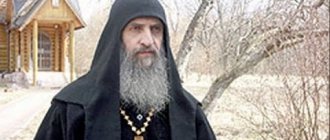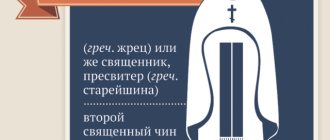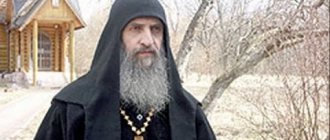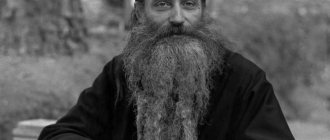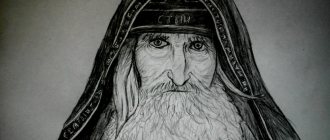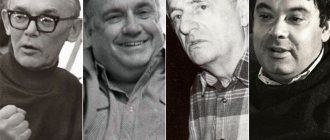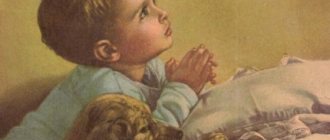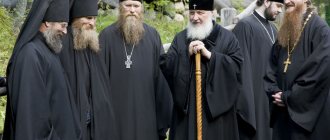Five years ago, the priest of the Pafnutievo-Borovsky Monastery, Hieromonk Photius won the “Voice” show. Today he turns 35 years old - he left Leps, gives concerts all over the country and considers modern music rubbish. And yet, the Russian Orthodox Church is confident that he will interest young people in Orthodoxy.
Childhood dream and first trials
On November 11, 1985, a boy was born into the family of unbelieving Molchanov parents who lived in Gorky, who was given the name Vitaly at birth. In the first days of his life, the child reacted sensitively to musical sounds; upon reaching the age of 7, he began learning to play the piano at a local music school. The child’s pure, angelic voice predetermined Vitalik’s participation in choral singing, and then in the church choir.
Hieromonk Photius (in the world Vitaly Mochalov)
School became the child’s first test of patience and forgiveness. Classmates did not like the calm, peace-loving Vitaly, who stood out among them for his love of singing and music. They made him a “whipping boy”; the boy endured all the bullying steadfastly, never hitting anyone in return. Perhaps school trials led Vitaly to seek protection from his mother and from God, who once came to him in a dream.
About other famous church figures:
- Father Roman Matyushin
- Irina Denisova
From the memoirs of the boy’s mother, it became known that the child demanded to be baptized in the church, because without this he would never go to heaven. It is unknown who and when revealed the beauty of Orthodoxy to the child during the rebellious years of perestroika. The boy, and with him his mother, accepted holy Baptism, but did not join the true worship of the Most High God and Savior. It was not customary in the family to attend divine services, and no one had heard of church life.
Thanks to vocal teacher Viktor Ivanovich, Vitaly ends up in the Blagovest Christian camp, where the boy first “tasted” all the beauty of Orthodox life, discovering liturgies and singing in the choir. A completely different Vitaly returned from the Orthodox camp; he began to learn prayers and acquire holy images.
Returning from the camp, Vitaly enters a music school and moves away from his childhood discovery of God, but the seeds of faith “sprouted” in his mother, who became a church-going Christian. The morning and evening rules were constantly read in the house; mother and son went to confession and communion once a month.
Music and TV projects
The love for music and singing did not leave him. Photius, a resident of the St. Paphnute Monastery, rediscovered singing when he began attending lessons with vocal teacher Viktor Tvardovsky, who trained monastic singers. According to Photius, he took a course from his Moscow teacher using his original method and was able to “tune” his voice.
View this post on Instagram
A post shared by Hieromonk Photius (@photymochalov) on Sep 26, 2015 at 5:42am PDT
Hieromonk Photius in the show “The Voice”
Later, priest Photius studied vocals for several years, using Tvardovsky’s exercises, specially developed for him and recorded on tape. Having developed his vocal skills, the performer began giving chamber concerts, and also released 2 discs, which included cover versions of a number of popular songs.
In 2013, Photius decided to participate in the “Voice” project. The hieromonk applied for the show back in season 2 and received an invitation to the casting, but did not dare to ask for the blessing of Metropolitan Clement of Kaluga and Borovsk. The monk did not appear on the TV show this year. In 2015, Photius again sent an application and again received an invitation. This time, Channel One wrote an official letter addressed to the Metropolitan, in which he asked to release monk Photius to participate in the music competition. Permission was received, and Photius appeared in the Voice.
Hieromonk Photius - “Lensky’s Aria”
For the first time in the history of the television show “The Voice,” a priest appeared as a contestant. Hieromonk Photius performed “Lensky’s Aria” at the “Blind Auditions”. This is a difficult composition to perform from the opera “Eugene Onegin”.
According to the hieromonk, he was blessed to participate in the competition by his spiritual father, Schema-Archimandrite Blasius. He provides Photius with prayerful support. The brethren of the monastery, along with Metropolitan Kliment of Kaluga and Borovsk, also happily supported participation in the show.
Hieromonk Photius ended up in the team of Grigory Leps, who turned to him after the “Blind Auditions”. The priest says that he expected to get into the team of Alexander Gradsky, since academic performance is closest to him.
View this post on Instagram
A post shared by Hieromonk Photius (@photymochalov) on Sep 26, 2015 at 5:33am PDT
Hieromonk Photius and Grigory Leps
The jury members warmly welcomed the unusual contestant. Alexander Gradsky defended the priest when Grigory Leps asked him provocative questions. And Vasily Vakulenko (Basta) took a blessing from Father Photius at the end of the competition.
In the last stages of the most popular musical project in Russia, Hieromonk Photius justified the trust of Leps, who accepted him into his team. From the first performances, the performer confidently walked towards victory. At the “Fights” stage, he performed in a duet with Ella Khrustaleva, singing the musical hit “Canto della terra”. During the “Knockouts” he managed to get ahead of his rivals thanks to Mikhail Glinka’s romance “I Remember a Wonderful Moment.”
Hieromonk Photius and Ella Khrustaleva - “Canto della terra”
In the quarter-finals, the musician captivated the audience and the jury with the song “On the Road to Zagorsk”; in the semi-finals, he presented to the audience the male version of the romance based on Marina Tsvetaeva’s poems “Requiem” (“Monologue”); in the final, Photius performed “Good night, gentlemen” and sang in a duet with Grigory Leps “Labyrinth”.
For the first time in 4 seasons, the “Voice” project was won by a clergyman. As the winner's song, Photius chose not the Russian romances that brought the monk victory, but performed the foreign composition “Per te.”
Hieromonk Photius and Gregory Leps - “Labyrinth”
Patriarch Kirill approved the victory and congratulated the hieromonk. In his congratulatory speech, the head of the Church reminded Photius of his monastic obligations and asked him to maintain his spirit and spiritual state. According to the patriarch, Photius’ fans appreciated not only the monk’s voice, television viewers voted for the image itself and were drawn to holiness. The monk proved that pop singing and serving the Church are compatible and can bear fruit, but now both believers and non-believers are wary of how the fame and popularity of the monk-musician will change.
At the beginning of 2016, fans of the singing monk became worried about the danger of not hearing Photius again. The media received information that the clergy banned him from continuing to participate in concerts and music festivals. In September, the issue of the hieromonk was discussed at a meeting of abbots and abbesses in the Cathedral of Christ the Savior in Moscow.
Hieromonk Photius - “Good night, gentlemen”
The clergy were concerned that the monk had gained popularity, enjoyed fame and earned a lot of capital. The indignation of the hierarchs was caused not even by Photius’s songs, but by the fact that he gives interviews, becoming the unofficial voice of the church. For example, when asked by journalists why he started singing, the monk complained about boredom in the monastery.
The conflict was resolved by Patriarch Kirill. He allowed Photius to continue performing, since the popularity of the monk, according to the patriarch, attracted fans to the Orthodox faith. In addition, the funds collected at the concerts, for which the hieromonk was accused of raising capital, went towards the restoration of churches in need of financial assistance.
The latest news from the life of the hieromonk only pleases his fans. Photius gives concerts in Russian cities, and the church leadership is no longer trying to ban the monk’s musical activities.
“Evening Urgant” - Hieromonk Photius
On March 18, 2016, the monk appeared on Channel One in the TV show “Evening Urgant”. In the talk show, the hieromonk did not refuse to sing and performed the composition “Alejate”.
On April 16, 2022, the monk again appeared on television in the Orthodox program “Soulful Supper” with Abbot Luke.
On May 16, Hieromonk Photius gave a concert in Kirov on the stage of the Rodina Palace of Culture. Before the performance, the musician visited the Alexander Church, where he asked permission to play the organ. The hieromonk studied to play this instrument, but for 16 years he did not have the opportunity to touch the organ again.
View this post on Instagram
A post shared by Hieromonk Photius (@photymochalov) on Mar 1, 2019 at 11:22am PST
After permission was received, Photius performed overtures by Johann Sebastian Bach, and also played together with musician Alexander Tevelev. The hieromonk shared his joy on this occasion with his fans through his Instagram account.
On May 31, the monk spoke in Pskov. The musician performed old romances and pop hits. On June 7, 2022, the singer gave a solo concert in Moscow, at Crocus City Hall. Photius’s guests were his colleagues from “The Voice” - Vitold Petrovsky, Gela Guralia, Renata Volkievich. Later in the interview, the hieromonk mentioned that it was the first time he spoke in front of such a large audience, which was exciting for him.
View this post on Instagram
A post shared by Hieromonk Photius (@photymochalov) on Dec 16, 2018 at 10:22pm PST
A year later, the premiere of Metropolitan Hilarion (Alfeev’s) oratorio “St. Matthew Passion” took place there, where the tenor role was performed by the monk Photius. The concert was attended by 350 musicians, among whom were artists from 5 choirs, instrumentalists and soloists.
Since the end of the “Voice” project, the singer’s repertoire has been replenished with works of various genres and eras. Among the rock compositions performed by the monk are the hits “Maybe I, maybe you” by the Scorpions group, “The City That Doesn’t exist” by Igor Kornelyuk, and “Love of my life” by Freddie Mercury. Photius also learned the Georgian song “Tbiliso” and the Norwegian “Teach me Your ways.” Together with composer Alexander Morozov he recorded the songs “Crimson Ring” and “Upper Room”, and Evgeny Krylatov gave the musician the composition “Be with me”.
Hieromonk Photius - “Be with me”
Photius visited the cities of Belarus, Uzbekistan, Germany, and the USA with concerts. The singer also released a record that included 15 romances by Russian composers - Alexander Dargomyzhsky, Nikolai Rimsky-Korsakov, Pyotr Tchaikovsky, Sergei Rachmaninov, Mikhail Glinka.
In a conversation with reporters, the hieromonk reports that he will no longer participate in music television shows. “The Voice” became the springboard for his creative biography that allowed him to raise the bar of vocal excellence. Today, Photius’s musical life is eventful, which is reflected in his attendance at monastic services. Despite the fact that the musician is often absent from the monastery, the authorities look at his concert activities condescendingly.
Emigration to Germany
After graduating from school, Mochalov entered a music school, where he had to interrupt his studies due to emigration with his parents to Germany. Surprisingly, the young man took with him not a grudge against his classmates, but vivid memories of the village of Vasilsursk, where he spent his school holidays.
The memory of the Volga expanses, giving freedom, a feeling of flight and ringing joy, settled forever in the heart of the future monk. Having learned to play the organ, Vitaly played at services in Catholic and Protestant churches, served in the Orthodox Church, the young man was entrusted with the position of sexton and reading the “Apostle”.
Fotiy Mochalov plays the organ
The seeds of faith sprouted in his youth, Vitaly enthusiastically reads the lives of the saints, and a desire was born in his heart to try to live a monastic life. The young man goes to the Pochaev Lavra, where he is accepted as a novice for 2 weeks.
Conversations with a visionary priest changed Vitaly’s attitude towards instrumental music, playing the organ and the spiritual world. Life in Germany was alien to the young Mochalov; he missed Russian monasteries.
Personal life
The personal life of Hieromonk Photius is service to the church and spiritual life. The priest's associates claim that he has a strong character, although he looks like a rather soft and even shy person. At one time, while in the monastery, he was forced to decide to serve in the army. But due to vision problems, he was refused.
“While everyone is at home” - Visiting Hieromonk Photius
Photiy (Vitaly Mochalov) knows German and English very well. He also performs songs in Georgian, Japanese, Italian and Serbian. In his free time he works in the monastery publishing house, doing layout and design. The monk is also interested in creating photos and video editing.
After winning the TV show “The Voice,” Photius was forced to begin leading a secular life along with the life of a monk. The hieromonk has a personal page and an official group on VKontakte, an account on Instagram, a microblog on Twitter and an official channel on YouTube, where videos from the hieromonk’s speeches are posted.
View this post on Instagram
A post shared by Hieromonk Photius (@photymochalov) on Aug 8, 2015 at 8:38am PDT
Photius also regularly broadcasts on Periscope, where he discusses everyday topics with fans, arranges video walks, shows how he prepares dinner or drives a car. For believers, such activity has become an argument in favor of the fact that the Church can be modern, close and interesting to young people.
The monk has a good sense of humor. For example, Photius posted a video on Instagram where a musician performs a romance into a microphone, and then calmly eats the device - the microphone turned out to be chocolate. His subscribers appreciated the joke.
Return to Russia
2005 was a turning point in Vitaly’s life. He returns to Russia and settles in the Borovsky Monastery, where the young man is accepted into the Pafnutiev brotherhood. Archimandrite Vlasiy (Peregontsev) himself became his spiritual mentor, who blessed the opening of professional singing training at the monastery.
Professional teacher-vocalist Viktor Tvardovsky devoted a lot of time to developing and strengthening the voice of the future winner of the “Voice” competition in 2022. Singing became a hobby for the young novice. The difficult monastic life more than once evoked the desire to compromise; life in a small cell and the desire to sing were in constant struggle.
Interesting! Having gone through the hard work of a novice, Vitaly makes the final decision to become a monk, and if God pleases, then to give up his dream of singing. The loving Lord accepted Vitaly’s sacrifice, blessing him to improve his unique voice.
Hieromonk Photius now
Now the winner of the “Voice” project continues to combine serving God and concert activities. At the beginning of 2022, the singer managed to visit Kaliningrad, Ufa, and the Christmas concert in Perm. Photius had the honor of opening the anniversary concert of composer Alexander Morozov.
View this post on Instagram
A post shared by Hieromonk Photius (@photymochalov) on Feb 28, 2019 at 7:29am PST
Hieromonk Photius in 2022
At the end of February, he performed for the first time in the theater hall of MMDM with the program “An Evening of Romance”. The concert featured the works “Lark”, “Lilac”, “It’s Good Here”, “Sad Night”, “Not the Wind, Blowing from the Heights” and other works by Russian composers.
The next performance of the oratorio “St. Matthew Passion” is scheduled for April, in which Hieromonk Photius again took part.
The path from monk to hieromonk
At the end of August 2010, Archimandrite Seraphim (Savostyanov) performed the ryasophore ritual, 25-year-old Molchanov took monastic vows with the name Savvaty, and the Monk Savvaty of Solovetsky became his patron. Six months later, in the St. John of Kronstadt Church in the city of Balabanovo, Kaluga Region, Metropolitan of Kaluga and Borovsk Clement (Kapalin) ordained the monk Savvaty as a hierodeacon.
At the end of August 2012, the Nativity Church of the Virgin Mary in Borovsky witnessed the tonsure of Father Savvaty with the name Photius. Along with the adoption of the minor schema, he accepted the patronage of the martyr Photius of Nicomedia.
Father Photius at the service
Rapid advancement up the church ladder continues; in the spring of 2013, Metropolitan of Kaluga and Borovsk Clement (Kapalin) in the Kaluga Cathedral Church of the Holy Trinity performed the rite of ordination of Father Photius as a hieromonk, who is currently the regent of the monastery of St. Paphnutius.
Path to the monastery
After living in Germany for three years, Vitaly returned to Russia without his parents with a firm decision to leave worldly life, the opportunity to be married, money, success and become a monk. The future priest began his ministry at the Pafnutyevo-Borovsky Monastery of the Kaluga diocese. His spiritual father was the famous confessor Schema-Archimandrite Blasius, to whom many believers turn for advice. When Vitaly still had doubts about the choice of his life path, it was Vlasiy who suggested that he stay in the monastery.
First, Vitaly was tonsured as a monk, in 2011 he was ordained a hierodeacon, and in 2012 he received the rank of hieromonk under the name Photius (the meaning of this name in Greek is “light”). Subsequently, the priest became the regent of the choir of this monastery.
The talented teacher Viktor Tvardovsky trained the monastery singers. With him, the priest again became interested in vocals and began to actively sing. According to Photius himself, Victor helped him “tune” his voice, and Photius still uses the exercises of his original technique.
The monk had many hobbies besides singing. At the monastery, he was engaged in the design and layout of parish publications, and was interested in photography and video editing. There was even a possibility that Photius would go to serve in the army, and the monk himself was going to repay his debt to his homeland, but due to vision problems he was not drafted into the army. Photius speaks excellent German and English.
Concerns of the monastery governor
The priest's speech made many reconsider their attitude towards religion; people saw that faith in God is alive and active. Patriarch Kirill presented the priest’s speeches and victory as a new type of missionary bringing the Gospel to people.
According to the abbot of the Pafnutyevo-Borovsk monastery, Bishop Seraphim (Savostyanov), after the missionary performance of Hieromonk Photius, young people began to appear in churches more often and became interested in churching, but the confessor fears for the spiritual life of Photius himself.
The enormous glory that literally fell on a humble and modest monk could become a weapon in the hands of the devil. Broadcasting songs performed by a monk on all channels in the country could lead to fans displaying vanity and pride.
At the beginning of 2016, the priests did not give their blessing to the priest’s concert activities. This issue was raised on September 22, 2016 during the abbot’s meeting in Moscow.
Hieromonk Photius sings in the church choir
To the appeal of Abbot Paphnutius, Patriarch Kirill of Moscow and All Rus' responded that this victory gave birth in the hearts of people to people’s love for the priest, and through his songs the Orthodox faith is also revealed to humanity.
The priest Photius himself sees the hand of God in his victory; he accepts all criticism, prays a lot and is grateful to the elders for their prayerful support. He perfectly understands all the responsibility to the Creator and people, so as not to lose the honor of the church.
Hieromonk Photius spends a lot of time traveling and concerts, but at the same time he does not shy away from monastic obediences, carries out his monastic feat with humility, giving the lion's share of concert income to the restoration and maintenance of churches.
Temptation in music
Father Photius also spoke about the great temptation in music to “appropriate God’s gift for oneself.”
“It is clear that it was given to us free of charge. But completely relying only on yourself to realize your talent is a sin. This is where star fever, arrogance and vanity arise,” he is sure.
After winning the show “The Voice,” the hieromonk himself was accused of having lost his way after gaining national fame. They even say about him that he performs supposedly because of boredom in the monastery.
Patriarch Kirill is confident that Photius’s activities are a kind of missionary work and many young people became interested in Orthodoxy after his appearance in Golos. The money that the priest collects at concerts goes to help temples and churches.
Missionary activities of Father Photius
Plunging into the life of the world, the hieromonk saw the full depth of human problems. Few could have imagined that his outward gentleness covered a strong personality, which was capable of not only thinking about people's problems, but also doing everything possible to sow Christian faith and purity in the world.
The videos and documentaries he created are part of a fresh spiritual world, revealing to the world the sin of abortion, civil marriage, immoral lifestyle and the beauty of staying in a monastery. The films of the godly servant of God take part in competitions and are seen by millions of people.
Fame and fame did not change the modest habits of the hieromonk, who managed to adapt to modern life:
- mastered computer technology;
- studied several languages, speaks English and German perfectly;
- He performs Georgian, Italian and Japanese songs.
The Periscope program raised its rating thanks to the participation of Father Photius, who is always ready to answer the most provocative questions, talk about cooking and driving.
Fotiy Mochalov maintains his own video blog
Openness and willingness to communicate have changed young people's perception of the church as something ancient and boring. Sometimes popularity and publicity tire a priest, and he dreams of solitude and one-on-one communication with the Creator.
Hieromonk Photius showed the priesthood and the world that the love of God can also be demonstrated by the worship of music, combining such manifestations as the beauty of singing and the special warmth poured into the wounded hearts of the rebellious world.
Biography
Hieromonk Photius is a monk, regent of the monastery choir, winner of the television show “The Voice” and the only Russian clergyman who gained popularity after participating in a music television show. The monk is meticulous about the selection of material for performance. Photius’s repertoire includes listeners’ favorite Russian romances, classic pop hits of the last century, arias from popular operas, rock classics and recognized foreign hits.

